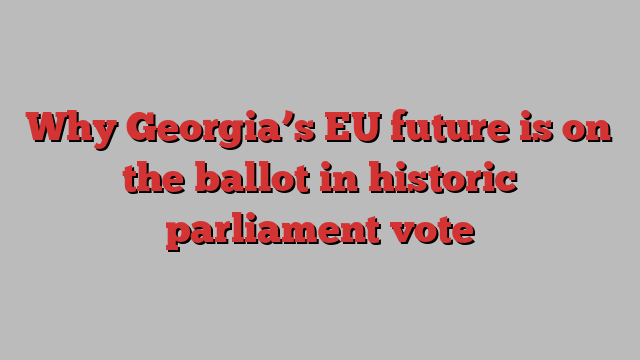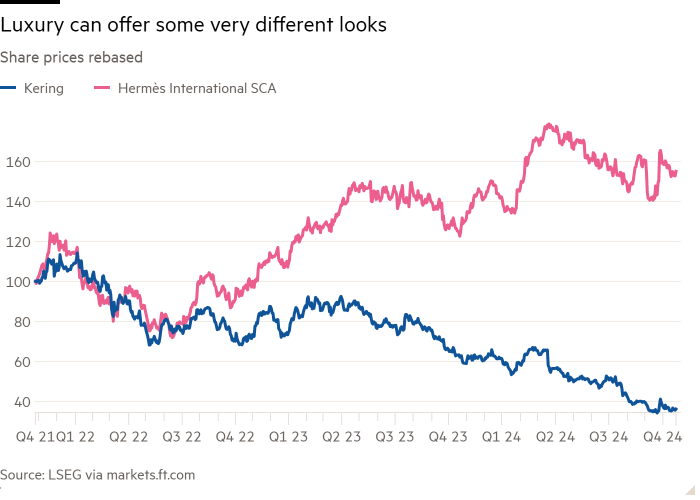
This article is an on-site version of our Europe Express newsletter. Premium subscribers can sign up here to get the newsletter delivered every weekday and Saturday morning. Standard subscribers can upgrade to Premium here, or explore all FT newsletters
Good morning. News to start: The EU should lecture developing countries less and listen more, the bloc’s Council president has warned, telling the Financial Times that a failure to show “respect” will mean more are drawn to rival spheres such as Vladimir Putin’s Brics summit this week.
Today, our Europe editor outlines what’s at stake in Georgia’s election tomorrow, and our Warsaw colleague reports on the busting of a criminal network smuggling migrants into the EU.
Have a wonderful weekend.
Fading dream
After last week’s close shave in Moldova, the EU’s pulling power faces another test this weekend on the other side of the Black Sea, writes Ben Hall.
Context: Georgia holds parliamentary elections tomorrow. The country is officially an EU candidate country, but a recent law on NGO transparency that Brussels fears will be used to intimidate and crush civil society has frozen its progress.
Voters will, in effect, be deciding whether their country can get back on track towards EU membership — or whether it veers off in an autocratic direction into Russia’s orbit. The elections are probably the most consequential vote since independence from the Soviet Union more than three decades ago.
The ruling Georgian Dream party controlled by oligarch Bidzina Ivanishvili is seeking a fourth term in office.
A fractured and querulous opposition has coalesced into four electoral groups. They spurned President Salome Zourabichvili’s request to form a single party but have signed up to her “charter”, which commits them to prioritising the institutional reforms needed for EU membership.
The opposition parties have touted polls indicating GD will win only a third of the vote. GD meanwhile has talked up its chances of achieving a “constitutional majority”, winning 113 out of 150 seats in parliament.
Analysts caution about the reliability of the polling. They say the race is tight and everything will hinge on turnout. One thing seems certain: a dispute over the result.
Notionally committed to EU accession, the GD government has done the opposite of what is needed to advance it, clamping down on LGBT+ rights, vowing to ban the opposition parties and railing against western interference. Ivanishvili has bizarrely accused EU and US officials in “the global war party” of plotting a revolution.
The EU has frozen Tbilisi’s accession bid and €121mn in aid. But unlike Washington it did not sanction officials for cracking down on peaceful protesters this summer, a possible warning of more US punitive measures to come.
Paweł Herczyński, the EU ambassador to Georgia, regretted this week that relations had fallen to a “historic low”.
If the election is deemed not free and fair, or GD tries to cling on to power, the EU will come under pressure to impose sanctions of its own against Ivanishvili and his inner circle — but it may face a veto from Hungary’s Viktor Orbán, an illiberal ally of the Georgian billionaire.
If GD wins there will inevitably be questions about how Georgia was “lost” and whether the EU was too accommodating for too long.
Chart du jour: Luxury inequality

Wealth creation benefits everyone. But in the context of slowing luxury spending, European players are increasingly divided between the haves and the have nots.
Busted
Poland’s border guards and Europol have dismantled what they say was an international crime network smuggling illegal migrants from Russia and Belarus into Poland and other EU countries, writes Raphael Minder.
Context: Polish Prime Minister Donald Tusk is pursuing a crackdown on illegal immigration to bolster Poland’s security against Russian aggression. Broadly backed by Brussels, Tusk wants to stop the “hybrid war” launched by Moscow and its ally in Minsk, which have been helping migrants cross Poland’s eastern border from Belarus.
The 11 people detained are citizens of Poland, Ukraine, Belarus and Russia. Europol said they helped about 600 migrants enter the EU, in return for each paying smuggling fees of about €5,000, sometimes in cryptocurrency, as well as an additional €500 for drivers in Poland to take them to their final destination in western Europe.
The migrants came mainly from Afghanistan, Egypt and elsewhere in the Middle East and had first travelled legally to Belarus, either directly or via Russia.
The arrests came after Tusk also announced this month that Poland would suspend the right to asylum, despite criticism from Polish NGOs, human rights lawyers and the United Nations High Commissioner for Refugees.
Tusk’s toughened border policy is broadly supported by voters on both sides of Poland’s political spectrum, even as some critics say the government is overstating the migrant threat for domestic political purposes ahead of May’s presidential election.
So while Europol’s intervention is not in itself good news for Warsaw, it gives Tusk fresh evidence to vindicate his warnings about Russia and Belarus weaponising migration.
What to watch today
-
European Commission president Ursula von der Leyen visits Serbia, meets with President Aleksandar Vučić.
-
European parliament president Roberta Metsola meets Pope Francis at the Vatican.
Now read these
Recommended newsletters for you
Trade Secrets — A must-read on the changing face of international trade and globalisation. Sign up here
Swamp Notes — Expert insight on the intersection of money and power in US politics. Sign up here
Are you enjoying Europe Express? Sign up here to have it delivered straight to your inbox every workday at 7am CET and on Saturdays at noon CET. Do tell us what you think, we love to hear from you: [email protected]. Keep up with the latest European stories @FT Europe